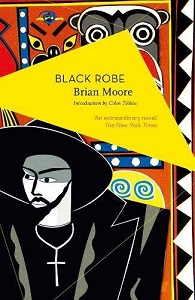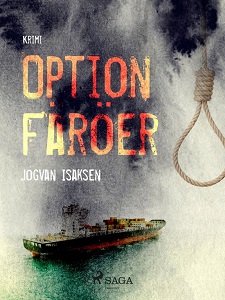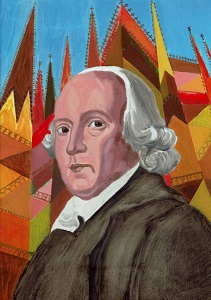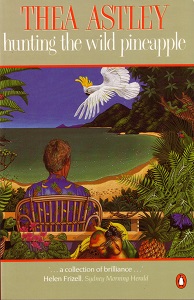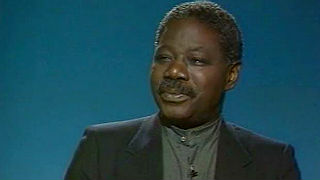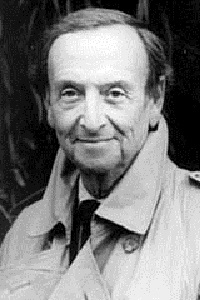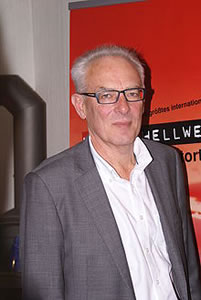De Engelse schrijver Frederick Forsyth werd geboren in Ashford, Kent, op 25 augustus 1938. Hij werd geplaatst op de beroemde Engelse Tonbridge School, een kostschool die deel uitmaakt van de Etongroup. Na Tonbridge studeerde Forsyth aan de Universiteit van Granada in Spanje. Al na vijf maanden staakte hij zijn studie en keerde terug naar Engeland. In mei 1956 sloot hij zich op zijn negentiende aan bij de RAF als één van de jongste piloten. In 1958 zwaaide hij af en werd journalist bij de Eastern Daily Press in Norfolk. In 1961 ging hij bij Reuters werken, eerst in Parijs en later in Oost-Europa. In 1965 keerde hij terug naar Engeland en werd verslaggever voor de BBC. In 1967 brak er in Nigeria een burgeroorlog uit. De provincie Biafra was in opstand gekomen en er woedde een strijd tussen rebellen en regeringstroepen. Forsyth verbleef van juli tot september in Biafra en versloeg de oorlog voor zijn werkgever. In 1970 had hij genoeg van de oorlog en keerde weer terug naar Engeland. Hij begon te werken aan een roman over een huurmoordenaar die in opdracht van de OAS een aanslag wil plegen op president De Gaulle. Forsyth gebruikte voor zijn roman de kennis die hij had opgedaan toen hij als correspondent voor Reuters in Parijs werkte. Elk feitje is gecontroleerd, elke straat, plein, regeringsinstelling of functionaris klopt. Ondanks al deze moeite werd het boek aanvankelijk geweigerd totdat uitgeverij Hutchinson het manuscript aankocht en uitgaf onder de titel, The Day of the Jackal. Het boek werd een bestseller en is inmiddels twee keer verfilmd. Na “The Day Of The Jackal” schreef Forsyth nog een groot aantal romans en verhalenbundels., waarbij steeds zijn voorliefde voor feiten wordt vermengd met spannende, thrillerachtige verhalen.
Uit: The Day of the Jackal
„Colonel Marc Rodin stared at the man from London. The visitor, apparently in his early thirties, was about six feet tall, with a lean athletic build. The face was suntanned, with regular but not remarkable features. He looked like a man who retained control of himself, but the eyes bothered Rodin. The flecked grey irises seemed smoky, and it took Rodin a few seconds to realise that they had no expression at all. Whatever thoughts did go on behind the smoke screen, nothing came through, and Rodin felt a worm of unease.
‘We know who you are,’ he began abruptly. ‘I had better introduce myself. I am Colonel Marc Rodin’
‘I know,’ said the Englishman. ‘You are chief of operations of the OAS. You are Major René Montclair, treasurer, and you are Monsieur André Casson, head of the underground.’ He stared at each in turn as he spoke, and reached for a cigarette. Then he lit up, leaned back and blew out the first stream of smoke.
‘Gentlemen, let us be frank. I know what you are and you know what I am. We both have unusual occupations. I operate for money, you for idealism. But we are all professionals. Therefore we do not need to fence. You have been making enquiries. It was important to me to know who was so interested in me. As soon as I discovered the identity of the organisation, two days among the French newspaper files in the British Museum were enough to tell me about you. Bon. What I would like to know is what you want.’
There was a silence for several moments; then Rodin spoke. ‘I will not bore you with the motivations behind our organisation. We believe France is now ruled by a dictator and can only be restored to Frenchmen if he dies. Our attempts to eliminate him so far have misfired. We are now considering engaging the services of a professional. However, we do not wish to waste our money. The first thing we would like to know is if it is possible.’

Frederick Forsyth (Ashford, 25 augustus 1938)
De Amerikaanse dichter Charles Wright werd geboren op 25 augustus 1935 in Pickwick Dam, Tennessee. Zie ook mijn blog van 25 augustus 2008 en ook mijn blog van 25 augustus 2009.
Body and Soul II
(for Coleman Hawkins)
The structure of landscape is infinitesimal,
Like the structure of music,
seamless, invisible.
Even the rain has larger sutures.
What holds the landscape together, and what holds music together,
Is faith, it appears–faith of the eye, faith of the ear.
Nothing like that in language,
However, clouds chugging from west to east like blossoms
Blown by the wind.
April, and anything’s possible.
Here is the story of Hsuan Tsang.
A Buddhist monk, he went from Xian to southern India
And back–on horseback, on camel-back, on elephant-back, and on
foot.
Ten thousand miles it took him, from 629 to 645,
Mountains and deserts,
In search of the Truth,
the heart of the heart of Reality,
The Law that would help him escape it,
And all its attendant and inescapable suffering.
And he found it.
These days, I look at things, not through them,
And sit down low, as far away from the sky as I can get.
The reef of the weeping cherry flourishes coral,
The neighbor’s back porch light bulbs glow like anemones.
Squid-eyed Venus floats forth overhead.
This is the half hour, half-light, half-dark,
when everything starts to shine out,
And aphorisms skulk in the trees,
Their wings folded, their heads bowed.
Every true poem is a spark,
and aspires to the condition of the original fire
Arising out of the emptiness.
It is that same emptiness it wants to reignite.
It is that same engendering it wants to be re-engendered by.
Shooting stars.
April’s identical,
celestial, wordless, burning down.
Its light is the light we commune by.
Its destination’s our own, its hope is the hope we live with.
Wang Wei, on the other hand,
Before he was 30 years old bought his famous estate on the Wang River
Just east of the east end of the Southern Mountains,
and lived there,
Off and on, for the rest of his life.
He never travelled the landscape, but stayed inside it,
A part of nature himself, he thought.
And who would say no
To someone so bound up in solitude,
in failure, he thought, and suffering.
Afternoon sky the color of Cream of Wheat, a small
Dollop of butter hazily at the western edge.
Getting too old and lazy to write poems,
I watch the snowfall
From the apple trees.
Landscape, as Wang Wei says, softens the sharp edges of isolation

Charles Wright (Pickwick Dam, 25 augustus 1935)
De Duitse schrijver Maxim Biller werd geboren op 25 augustus 1960 in Praag. Zie ook mijn blog van 25 augustus 2007 en ook mijn blog van 25 augustus 2008 en ook mijn blog van 25 augustus 2009.
Uit: Wenn ich einmal reich und tot bin
“Ich mag keine Gedichte, sie sind mir fremd, und ich verstehe auch nichts von bisexuellen russischen Poetessen à la Marina Zwetajewa. Bei meiner Mutter jedoch liegt der Fall anders, und obwohl man mit der Behauptung vorsichtig sein sollte, sie lebe ganz allein und für sich in einer kleinen, engen Welt aus Jamben, Trochäen und Daktylen, ist doch etwas dran, denn Lyrik bedeutet ihr sehr viel.
Früher, erinnere ich mich, verschwand sie manchmal für ganze Nachmittage im Schlafzimmer, um zu lesen. Wenn sie mich dann plötzlich von dort rief, wußte ich genau, daß sie mich an ihren Versabenteuern beteiligen wollte. So stand ich in der Tür, trat von einem Fuß auf den anderen und sah sie an. Die Gardinen waren zugezogen, nur die Bettlampe gab ein gedrängtes, ockergelbes Licht ab. Meine Mutter lag am äußersten Rand des Ehebettes, im Morgenrock, zugedeckt, den Rücken von dicken Kissen hochgestützt, die Beine angewinkelt. Auf ihren Knien ruhte ein Buch von Mandelstam, das sie seit Wochen studierte. Bestimmt las sie schön, und ich hatte auch nie etwas gegen ihre russischen Gedichte — aber sie interessierten mich eben nicht. Manchmal ließ ich das Ganze über mich ergehen, manchmal nicht, weshalb ich dann sofort angeödet die Schlafzimmertür von außen schloß.
Die Mandelstam-Phase ist längst vorbei. Ich lebe jetzt in München, doch meine Eltern wohnen nach wie vor in dem alten Bürgerhaus am Hamburger Rotherbaum, wo wir 1974 auf unserem Weg von Moskau über Wien, Israel und New York schließlich untergekommen waren, zufrieden über jene lebensnotwendige Portion materieller und ziviler Sicherheit, die Deutschland uns bot.”

Maxim Biller (Praag, 25 augustus 1960)
De Engelse schrijver Martin Amis werd geboren op 25 augustus 1949 in Cardiff, South Wales. Zie ook mijn blog van 25 augustus 2007 en ook mijn blog van 25 augustus 2008 en ook mijn blog van 25 augustus 2009.
Uit: The War Against Cliché
„What happened, El?’ said Vernon Presley to his son, one day in 1956. Elvis was twenty-one at the time, and a multimillionaire. ‘The last thing I can remember is I was working in a can factory and you were driving a truck.’ Elvis laughed. ‘I don’t know what it is,’ he later told a reporter. ‘I just fell into it, really.’
What happened was this. The Presleys were Depression-shoved nomads from the deep rural South. Elvis’s uncle, Vester Presley, was a teenager before he owned his first pair of shoes. Looking for work, the family straggled into Memphis. Elvis was a half-employed slum spiv when he did his first audition. He recorded the rockabilly classic ‘That’s All Right, Mama’—and suddenly the tenement Okies found themselves in Graceland, a Doric mansion at the far end of Elvis Presley Boulevard.
It was during Elvis’s much-publicized stint of military service in Germany that the present writers came into the story. Dee Stanley was the wife of a morose sergeant stationed in Bad Nauheim. On a bored impulse Dee gave El a call, to offer him some Southern hospitality. They arranged to meet for coffee. As it happened, Elvis was on manoeuvres; but Dee was greeted and squired by the courtly, personable and recently widowed Vernon… On her return to the US, Dee got a divorce and ensconced herself at Graceland, with her three small sons, Billy, Rick and David.
Elvis, We Love You Tender is their story, cobbled together twenty years on with the excitable help of journalist Martin Torgoff. Elvis’s entourage was divided into TCBers and TLCers: those who Took Care of Business and those who gave Tender Loving Care when the exhausted menfolk returned from the road.“

Martin Amis (Cardiff, 25 augustus 1949)
De Faeröerse schrijver Jógvan Isaksen werd geboren op 25 augustus 1950 in 25/08/1950 in Tórshavn, Faröer Eilanden. Na zijn afstuderen in 1970 in Tórshavn studeerde hij Scandinavistiek aan de universiteit van Aarhus n werd hij in 1982 Master in de Scandinavische literatuur. Sinds 1986 is hij docent aan de Universiteit van Kopenhagen en doceert hij Faeröisch. Sinds 2000 is hij redacteur van het tijdschrift Nordisk literatuur van de Noordse Raad. Sinds 1978 is Isaksen actief als schrijver. In 1994 kreeg hij de Literatuurprijs van de Faeröer voor zijn leerboek Literaturwissenschaftliches Í hornatøkum vid Procrustes over de schrijver Andreassen Hanus (Hanus Kamban), maar ook voor zijn hoofdwerk, dat de Faeröer literatuur als belangrijkste onderwerp heeft. De detective Blid á Føroyalandi summarnátt uit 1990 was de eerste misdaadroman ooit in de Faeröische taal en werd onmiddellijk vertaald in het Deens en IJslands en later in het Duits en Engels.
Uit: Endstation Färöer (Vertaald door Christel Hildebrandt)
„Das Feuer loderte zum dämmrigen Himmel empor. Die Flammen rissen sich von ihrem heißen Ursprung los und führten für einen kurzen Augenblick ihr eigenes Leben. Der Nachtwind kam langsam herangestrichen und mit ihm stieg und fiel der Funkenregen, tanzte umher und verschwand gen Himmel. Die Gesänge waren verstummt und die Meisten standen nur da und starrten ins Feuer. Sie versuchte, etwas zu finden, wohinter sie sich hocken konnte. Nun hatte sie so lange ausgehalten, jetzt war sie an der Reihe. Sie war etwas unsicher auf den Beinen und sagte zu sich selbst, dass sie aufpassen musste, wenn sie noch etwas von der Nacht haben wollte. Und sie wollte viel haben. Mehr als irgendeiner dieser Ignoranten, die jetzt damit angefangen hatten, aus dem Liederbuch des Färöischen Volkes zu singen, sich erträumen konnte. Aber sie musste aufpassen und einen klaren Kopf bewahren. Warum war die Hochebene nur so kahl? Es gab nicht einmal einen passenden Stein, um sich dahinter zu verstecken. Sie war jetzt so weit von den anderen entfernt, dass sie meinte, hier würde auch ein kleinerer Stein genügen. Während sie dasaß, hörte sie es irgendwo im Dunkeln atmen. Eine Gänsehaut überlief sie, aber das war nicht der richtige Augenblick für schwache Nerven. Wahrscheinlich war es ein Schaf. Oder ein Mensch, der wie sie nach einem Ort suchte, an dem er der Natur freien Lauf lassen konnte. Die Götter waren Zeuge, dass reichlich getrunken wurde. Auf dem Weg zurück sah sie auf dem nördlichen Ende der Hochebene die Umrisse einer Person sich gegen den Himmel abzeichnen. Jetzt ist die Stunde gekommen, dachte sie plötzlich. Und ihr wurde im gleichen Moment klar, dass man weit davon entfernt ist, nüchtern zu sein, wenn einem solche Worte einfallen. Sie blieb stehen. Hatte sie Schritte auf dem Kies gehört? Nein, da war nichts. Nur von der Versammlung dröhnte es herüber: Und Menschen verschwinden wie Schatten von Pfaden und taufeuchten Grasmatten …“

Jógvan Isaksen (Tórshavn, 25. augustus 1950)
De Congolese dichter en schrijver U Tchicaya Tam’si werd geboren op 25 augustus 1931 in Mpili. Zijn officiële naam is Gerald-Felix Tchicaya; zijn artiestennaambetekent zoiets als: een kleine krant die namens een land in Kikongo. U Tam’si bracht zijn jeugd door in Frankrijk, waar hij werkte als journalist, totdat hij in 1960 terugkeerde naar zijn vaderland. Terug in Congo bleef hij werken als journalist en tijdens deze periode heeft hij contact onderhouden met de politicus Patrice Lumumba. In 1961, begon hij te werken voor de UNESCO. Sinds 1989 wordt in de kleine Marokkaanse stad Asilah om de twee jaar de Tchicaya U Tam’si-Award uitgereikt voor Afrikaanse poëzie. U Tam’si’s poëzie bevat elementen van het surrealisme, heeft vaak levendige historische beelden en geeft commentaar op het Afrikaanse leven en de Afrikaanse maatschappij, evenals op de mensheid in het algemeen.
The Belly Remains
Sure the belly remains chaste
under a treasure of white bones
then open to a fighter’s song
lost body and soul
in the flames of his passion
As at Mont Ségur
As elsewhere where
a feast of fallow bodies
invents tortures.
Bannered at the spectacle made of it
one hears chimings a-rattle
from one song to the other
under an own sky
when one no longer knows
in what night were lost
the body and wherewithal of a crown
got it in the spine and on the chine.
Sure, the belly remains.
Is it more filthy than chaste?
Because of certain heartbreaks?
Love for love’s
sake is as depressing as the rest.
But love for life’s sake
the one one gives with the belly
the earth takes charge of it
Thank god the visionaries fall
most often on their backs
most often with arms open wide
most often
with their belly skyward!
Vertaald door Pierre Joris
Forest, Part III (of V)
– Where are the flowers that smell
of the warm flesh under the armpits?
– In paradise on the victim’s burial mound
Those that as a child I lapped
closed my burning eyes
the sun itself on my cropped head
through it was all red lead
ah! I still danced though I had no woman
hilarious toads and astounding pythons
as if my dead returned through them.

U Tchicaya Tam’si (25 augustus 1931 – 22 april 1988)
De Australische schrijfster Thea Astley werd geboren op 25 augustus 1925 in Brisbane. Ze was een productief schrijfster, die vanaf 1958 meer dan 40 jaar bleef publiceren. Op het moment van haar dood, had ze meer Miles Franklin Awards, de belangrijkste literaire onderscheiding in Australië, gewonnen dan welke andere schrijver ook. Astley werd opgeleid aan de All Hallows ‘School, studeerde kunsten aan de Universiteit van Queensland en werd vervolgens opgeleid om leraar te worden. Na haar huwelijk met Jack Gregson in 1948 verhuisde ze naar Sydney waar ze doceerde aan verschillende middelbare scholen, maar zij bleef ook altijd schrijven..Ze begeleidde studenten aan de Macquarie University van 1968 tot 1980, toen zij full-time ging schrijven en zij en haar man verhuisden naar Kuranda in Noord-Queensland. In de late jaren 1980 verhuisden ze naar Nowra op de NSW South Coast, en, na de dood van haar man in 2003, verhuisde ze naar Byron Bay. Astley vond haar materiaal in de krant en op haar reizen, maar meestal in de verschillende gemeenschappen waarin zij en haar man woonden.
Uit: It’s Raining in Mango
„Cornelius Laffey had slipped ashore, father told her often enough, from the dinghy of the sailing ship Jeannie Dove, one steamy late March day, onto burning sand in a place that would later be called Bowen. The nothingness appalled him, quite apart from the heat, the mangroves, the flies. His soft northern skin, attuned to the Canadian maritime provinces, crisped as if it had been placed on a griddle. He thought momentarily of the grey waterfront of St. John, but flies alone kept him busy. For days the ship’s party had been camped offshore on Stone Island, because the mainland natives-foolishly, all the crew agreed-were preventing their landing. Stone Island was nothing like the tropical nirvana his dreamy Celtic soul had imagined. His hands were pulpy from trapping fish in reef pools, his feet skinned and bleeding from coral. He was convinced of error, of misjudgement. He had celebrated his twenty fourth birthday gutting mackerel hauled from the shallows of the most virulent blue waters he had ever seen. His scaling knife slipped and cut his thumb. Scales clung like spangles. From across the channel came the sound of rifle fire as officious colonisers showed the indigenous people what’s what in a ratatat, idiot anticipation of another civil war half a world and half a week away. It was 1861. That early day in April when the township, cleared of black landowners, was proclaimed, Cornelius was looking for and expecting a frontier magic he still failed to find a month later. Scowling at the hopeless canvas village that scabbed the bay-line, he resolved his stay would be the shortest. He had come to this new southern land as a journalist, trained for something more than sandflies and heat, he thought aggrievedly. With a yearning affection he recalled his old newspaper offices in St. John.“

Thea Astley (25 augustus 1925 – 17 augustus 2004)
De Ierse schrijver Brian Moore werd geboren in Belfast op 25 augustus 1921. Zie ook mijn blog van 25 augustus 2008 en ook mijn blog van 25 augustus 2009.
Uit: The Lonely Passion of Judith Hearne
“The first thing Miss Judith Hearne unpacked in her new lodgings was the silver-gramed photograph of her aunt. The place for her aunt, ever since the sad day of the funeral, was on the mantelpiece of whatever bed-sitting-room Miss Hearne happened to be living in. And as she put her up now, the photograph eyes were stern and questioning, sharing Miss Hearne’s own misgivings about the condition of the bed-springs, the shabbiness of the furniture and the run-down part of Belfast in which the room was situated.
After she had arranged the photograph so that her dear aunt could look at her from the exact centre of the mantelpiece, Miss Hearne unwrapped the white tissue paper which covered the coloured oleograph of the Sacred Herat. His place was at the head of the bed, His fingers raised in benediction. His eyes kindly yet accusing. He was old and the painted halo around His head was beginning to show little cracks. He had looked down on Miss Hearne for a long time, almost half her lifetime. The trouble about hanging the Sacred Heart, Miss Hearne discovered, was that there was no picture hook in the right place. She had bought some picture hooks but she had no hammer. So she laid the Sacred Heart down on the bed and went to the bay window to see how the room looked from there.
The street outisde was a university bywater, once a good residential area, which had lately been reduced to the level of taking in paying guests. Miss Hearne stared at the houses opposite and thought of her aunt’s day when there were only private families in this street, at least one maid to every house, and dinner was at night, not at noon. All gone now, all those people dead and all the houses partitioned off into flats, the bedrooms cut in two, kitchenettes jammed into linen closets, linoleum on the floors and ‘To Let’ cards in the bay windows. Like this house, she thought.”

Brian Moore (25 augustus 1921 – 10 januari 1999)
De Duitse dichter, schrijver, theoloog en cultuur-filosoof Johann Gottfried von Herder werd geboren in Mohrungen op 25 augustus 1744. Zie ook mijn blog van 25 augustus 2006 en ook mijn blog van 25 augustus 2007 en ook mijn blog van 25 augustus 2008 en ook mijn blog van 25 augustus 2009.
Lied des Lebens
Flüchtiger als Wind und Welle
Flieht die Zeit; was hält sie auf?
Sie genießen auf der Stelle,
Sie ergreifen schnell im Lauf;
Das, ihr Brüder, hält ihr Schweben,
Hält die Flucht der Tage ein.
Schneller Gang ist unser Leben,
Laßt uns Rosen auf ihn streun.
Rosen; denn die Tage sinken
In des Winters Nebelmeer.
Rosen; denn sie blühn und blinken
Links und rechts noch um uns her.
Rosen stehn auf jedem Zweige
Jeder schönen Jugendtat.
Wohl ihm, der bis auf die Neige
Rein gelebt sein Leben hat.
Tage, werdet uns zum Kranze
Der des Greises Schläf’ umzieht
Und um sie in frischem Glanze
Wie ein Traum der Jugend blüht.
Auch die dunkeln Blumen kühlen
Uns mit Ruhe, doppelt-süß;
Und die lauen Lüfte spielen
Freundlich uns ins Paradies.

Johann Gottfried von Herder (25 augustus 1744 – 18 december 1803)
Monument in Bückeburg
